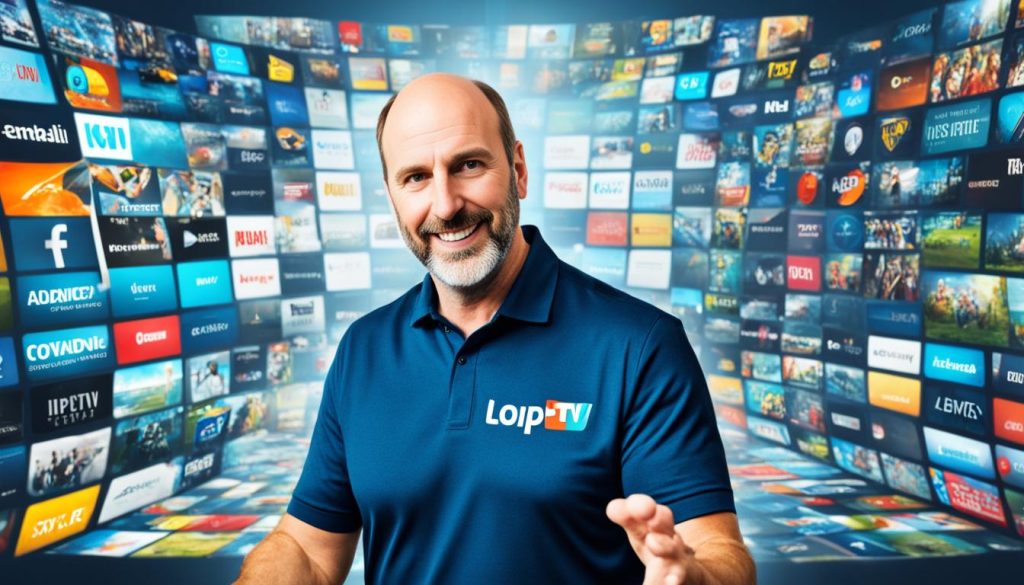The rise of Internet Protocol TV (IPTV) has transformed the video content industry, with traditional channels like satellite and cable TV taking a backseat. The market value of IPTV was estimated at approximately £72.4 billion in 2020 and is expected to reach an estimated £194.21 billion by 2026, indicating a compound annual growth rate (CAGR) of 18% between 2021 and 2026. This rapid growth underscores the increasing demand for content acquisition, licensing, and distribution through IPTV service providers.
Key Takeaways
- IPTV service providers must obtain proper licensing agreements with content owners to ensure the legality of the content they offer.
- Securing broadcast rights is crucial for IPTV service providers to legally offer live TV channels and on-demand content to their subscribers.
- IPTV service providers must comply with copyright laws by obtaining the necessary licensing agreements with content creators and copyright holders.
- IPTV service providers can offer a diverse range of content, including live TV channels, video-on-demand, and time-shifted TV, to meet the evolving preferences of viewers.
- The decentralised nature of IPTV means that tracing individual users can be challenging, but engaging in unlawful activities, such as accessing pirated content, can still have legal consequences.
Introduction to IPTV Content Acquisition
The rise of Internet Protocol Television (IPTV) has revolutionised the way viewers consume television content. This innovative technology delivers television programming over IP networks, allowing users to stream content continuously, in contrast to traditional cable TV. The first source provides an overview of IPTV, highlighting its transformative impact on the video content industry.
Understanding IPTV and Its Rise
IPTV is a medium that enables the communication of television programming to viewers using the internet. This process involves delivering the usual television content over IP networks, granting users the ability to stream content seamlessly, unlike the constraints of traditional cable TV. The growing popularity of IPTV is evidenced by its market value, which was estimated at approximately £72.4 billion in 2020 and is expected to reach an estimated £194.21 billion by 2026, a CAGR of 18% between 2021-2026.
The Decentralised Nature of IPTV
The second source emphasises the decentralised nature of IPTV, where it does not have a single owner. Instead, IPTV is an open market with various companies and individuals operating as service providers, offering their services to users. This decentralised structure means that the legal status of IPTV can vary, and it is crucial for IPTV service providers to obtain proper licensing agreements to ensure the legality of the content they offer to their subscribers.
How do IPTV service providers acquire their content?
IPTV service providers must obtain proper licensing agreements with content owners to ensure the legality of the content they offer. The decentralised nature of IPTV means that tracing individual users can be challenging, but engaging in unlawful activities, such as accessing pirated content, can still have legal consequences.
Licensing Agreements with Content Owners
IPTV service providers must negotiate and secure licensing agreements with content owners, production houses, and broadcasters to legally offer live TV channels and on-demand content to their subscribers. This process ensures that the IPTV service provider has the necessary rights to distribute the copyrighted material, complying with IPTV content licensing and IPTV copyright compliance requirements.
Obtaining Broadcast Rights
In addition to licensing agreements, IPTV service providers must also obtain IPTV broadcast rights to distribute live television content. This involves negotiating with the respective content owners and broadcasters to secure the necessary permissions and rights to stream live programming to their subscribers, ensuring IPTV legal compliance.
Compliance with Copyright Laws
While the IPTV technology itself is not illegal, the unauthorised distribution or use of copyrighted content can infringe upon intellectual property rights. IPTV service providers must ensure compliance with copyright laws by obtaining the necessary licensing agreements with IPTV content creators and IPTV copyright holders. This helps to prevent IPTV anti-piracy measures and maintain the legality of their IPTV content distribution and IPTV content offerings.

Types of Content Offered by IPTV Providers
The versatility of IPTV (Internet Protocol Television) allows service providers to offer a diverse range of content options to their subscribers. From live TV channels to video-on-demand (VOD) and time-shifted TV, IPTV empowers users with a wealth of entertainment choices.
Live TV Channels
IPTV service providers can deliver live broadcast content, much like the traditional television experience. Viewers can enjoy a vast array of IPTV live TV channels, including sports events, news programmes, and popular entertainment shows, all streamed directly to their devices using the internet infrastructure.
Video-on-Demand
In addition to live programming, IPTV service providers can also offer comprehensive IPTV video-on-demand libraries. Subscribers can access a vast collection of movies, TV series, documentaries, and more, allowing them to enjoy IPTV content offerings at their convenience, similar to popular streaming platforms.
Time-Shifted TV
IPTV service providers can further enhance the viewing experience by offering IPTV time-shifted TV features. This enables subscribers to catch up on content they may have missed during live broadcasts, providing them with the flexibility to binge-watch their favourite shows at their preferred time. The IPTV service features of time-shifted TV, also known as catch-up TV, cater to the evolving viewing habits of modern audiences.
The combination of IPTV live TV channels, IPTV video-on-demand, and IPTV time-shifted TV offerings empowers IPTV service providers to deliver a comprehensive and versatile entertainment experience to their subscribers, catering to a wide range of preferences and viewing habits.
Conclusion
IPTV has transformed the way viewers in the United Kingdom consume television content, offering a wide array of options through diverse service providers. While the legal aspects surrounding IPTV can vary, adhering to licensed IPTV service providers ensures a legitimate streaming experience. By understanding the intricate IPTV content acquisition process, including licensing agreements, broadcast rights, and copyright compliance, IPTV service providers can curate a diverse range of content, from live TV channels to video-on-demand and time-shifted TV, to meet the evolving preferences of viewers.
As the IPTV market continues to grow and evolve, it is crucial for service providers to navigate the legal landscape carefully, ensuring they comply with all necessary regulations and content licensing requirements. This not only protects the rights of content creators and copyright holders but also provides viewers with a reliable and secure streaming platform that caters to their diverse entertainment needs.
In the ever-changing landscape of digital media, IPTV content offerings have become a pivotal component of the modern viewing experience. By embracing the opportunities presented by IPTV technology and maintaining a steadfast commitment to legal compliance, service providers can deliver a seamless, content-rich experience that resonates with audiences across the United Kingdom.
FAQ
What is IPTV and how is it transforming the video content industry?
Internet Protocol TV (IPTV) is a medium for communicating television programming to viewers using the internet. IPTV is transforming the video content industry, with the traditional channels for broadcasting video content, such as satellite or cable TV, taking a back seat. The market value of IPTV was valued at approximately £72.4 billion in 2020 and is expected to rise to an estimated £194.21 billion by 2026, a CAGR of 18% between 2021-2026.
What is the decentralised nature of IPTV, and how does it impact the legal status of IPTV services?
IPTV has a decentralised nature, where it does not have a single owner. Instead, IPTV is an open market with various companies and individuals operating as service providers, offering their services to users. The legal status of IPTV can vary, and it is essential for IPTV service providers to obtain proper licensing agreements to ensure the legality of the content they offer.
How do IPTV service providers acquire the content they offer to their subscribers?
IPTV service providers must obtain proper licensing agreements with content owners to ensure the legality of the content they offer. This involves negotiating and securing agreements with content owners, production houses, and broadcasters to legally offer live TV channels and on-demand content to their subscribers. IPTV service providers must also ensure compliance with copyright laws by obtaining the necessary licensing agreements with content creators and copyright holders.
What types of content can IPTV service providers offer to their subscribers?
IPTV service providers can offer a variety of content to their subscribers, including live broadcast content, similar to the live football games or award shows that viewers watch on traditional television. They can also offer video-on-demand (VOD) services, where subscribers can access a library of movies, TV shows, and other content at their convenience. Additionally, IPTV service providers can offer time-shifted TV, which allows viewers to watch content they may have missed on live TV for a limited period.



